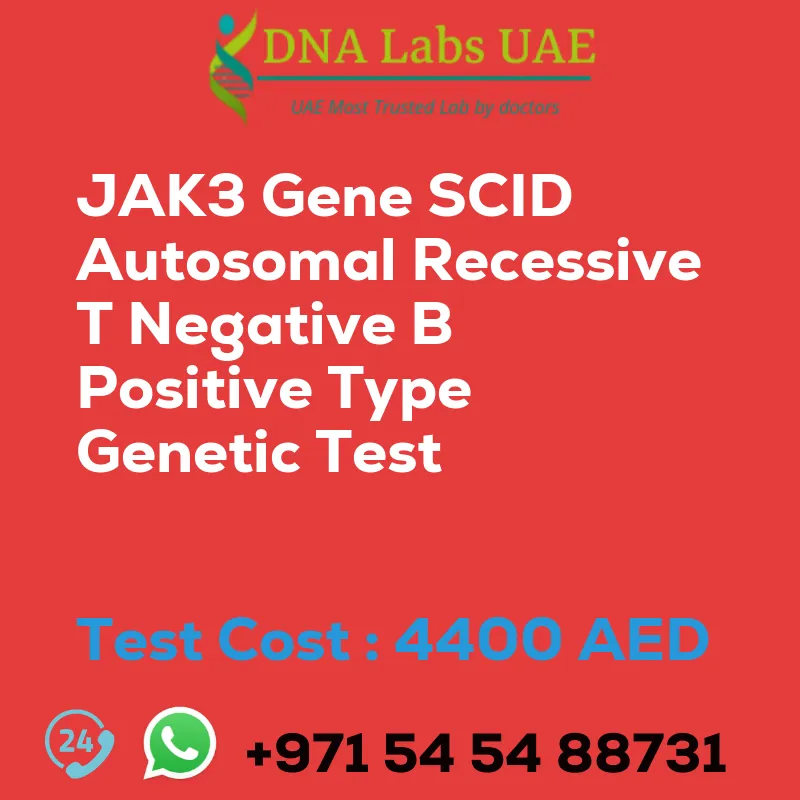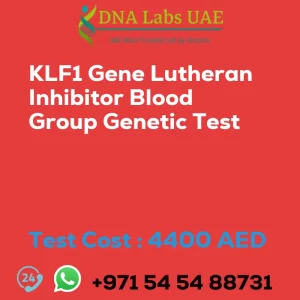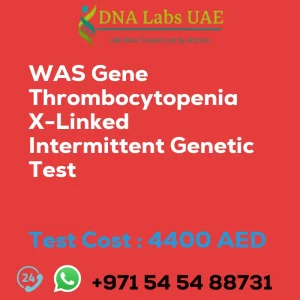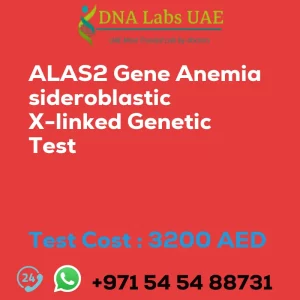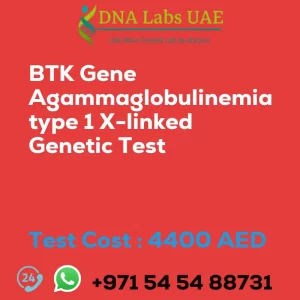JAK3 Gene SCID Autosomal Recessive T Negative B Positive Type Genetic Test
At DNA Labs UAE, we offer the JAK3 Gene SCID autosomal recessive T negative B positive type genetic test. This test is designed to analyze the JAK3 gene, which is associated with Severe Combined Immunodeficiency (SCID), a group of genetic disorders that affect the immune system.
Test Components
- Price: 4400.0 AED
- Sample Condition: Blood or Extracted DNA or One drop Blood on FTA Card
- Report Delivery: 3 to 4 Weeks
- Method: NGS Technology
- Test Type: Hematology
- Doctor: Hematologist
- Test Department: Genetics
Pre Test Information
Prior to undergoing the JAK3 Gene SCID autosomal recessive T negative B positive type genetic test, it is important to provide the clinical history of the patient. Additionally, a genetic counseling session may be conducted to draw a pedigree chart of family members affected with the JAK3 Gene SCID autosomal recessive T negative B positive type NGS Genetic DNA Test gene JAK3.
Test Details
The JAK3 gene is located on chromosome 19 and encodes for a protein called Janus kinase 3. This protein plays a crucial role in the signaling pathways of immune cells, including T cells and B cells. NGS (Next-Generation Sequencing) genetic testing is utilized to analyze the JAK3 gene and identify any genetic variants or mutations that may be responsible for the disease.
In the case of autosomal recessive SCID with a T negative B positive phenotype, it indicates that the individual has a mutation in both copies of the JAK3 gene. Autosomal recessive inheritance means that both copies of the gene must be affected for the disease to manifest. T negative B positive phenotype suggests that the individual has a deficiency in T cells (T negative) but still has functional B cells (B positive).
NGS genetic testing is a valuable tool for diagnosing autosomal recessive SCID by identifying mutations in the JAK3 gene. This information can be used for genetic counseling, family planning, and potentially for guiding treatment options, such as hematopoietic stem cell transplantation.
| Test Name | JAK3 Gene SCID autosomal recessive T negative B positive type Genetic Test |
|---|---|
| Components | |
| Price | 4400.0 AED |
| Sample Condition | Blood or Extracted DNA or One drop Blood on FTA Card |
| Report Delivery | 3 to 4 Weeks |
| Method | NGS Technology |
| Test type | Hematology |
| Doctor | Hematologist |
| Test Department: | Genetics |
| Pre Test Information | Clinical History of Patient who is going for JAK3 Gene SCID autosomal recessive T negative B positive type NGS Genetic DNA Test. A Genetic Counselling session to draw a pedigree chart of family members affected with JAK3 Gene SCID autosomal recessive T negative B positive type NGS Genetic DNA Test gene JAK3 |
| Test Details |
The JAK3 gene is associated with Severe Combined Immunodeficiency (SCID), a group of genetic disorders that affect the immune system. SCID is characterized by a severe impairment in the function of both T cells and B cells, leading to a compromised immune response. The JAK3 gene is located on chromosome 19 and encodes for a protein called Janus kinase 3. This protein plays a crucial role in the signaling pathways of immune cells, including T cells and B cells. NGS (Next-Generation Sequencing) genetic testing refers to a high-throughput sequencing technology that allows for the rapid and accurate sequencing of large amounts of DNA. In the context of SCID, NGS genetic testing can be used to analyze the JAK3 gene and identify any genetic variants or mutations that may be responsible for the disease. In the case of autosomal recessive SCID with a T negative B positive phenotype, this suggests that the individual has a mutation in both copies of the JAK3 gene. Autosomal recessive inheritance means that both copies of the gene must be affected for the disease to manifest. T negative B positive phenotype indicates that the individual has a deficiency in T cells (T negative) but still has functional B cells (B positive). NGS genetic testing can help diagnose autosomal recessive SCID by identifying mutations in the JAK3 gene. This information can be useful for genetic counseling, family planning, and potentially for guiding treatment options, such as hematopoietic stem cell transplantation. |

